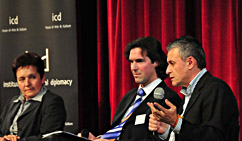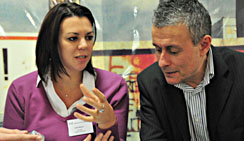"A World Without Walls":
An International Congress on "Soft Power", Cultural Diplomacy and Interdependence


Solomon Isaac Passy
Former Foreign Minister of Bulgaria and the Chairman-in-Office of the OSCE
Solomon Isaac Passy was born in Plovdiv, Bulgaria and is the son of the famous Bulgarian philosopher Isaac Passy. Passy attended the University of Sofia, where he received a doctorate in Mathematical Logic and Computer Science. Following this he worked as an Assistant Professor at the University of Sofia and Bulgarian Academy of Sciences. During this period he worked on furthering the study of hybrid logic and studying the boundaries of human knowledge and the limits of human thinking. Passy is also the author of a number of publications in international scientific journals.
In the 1980’s Passy was involved in the dissident movement to end totalitarian communist rule in Bulgaria. He was strongly opposed to the anti-Muslim repressive policies of the Communist regime and he was also an activist in the Ecoglasnost opposition group. In 1990, he helped found and then became President and CEO of the Atlantic Club of Bulgaria, a non-governmental organization focused on lobbying for NATO accession; Bulgaria was admitted to NATO in 2004. It was the first pro-Atlantic NGO to be founded in a non-NATO member state. The Club works to promote Bulgaria’s integration with and role in the Atlantic Alliance, and all Euro-Atlantic political, security, and economic structures. Within Bulgaria, the Atlantic Club serves the broader purpose of supporting democracy, human rights, free market economics and the rule of law. Although no longer Chairman and CEO of the Atlantic Club, Passy remains heavily involved and has been Honorary President since 2001.
Solomon Passy also founded the Bulgarian Green Party in 1990 and was elected into the Bulgarian National Assembly. As an MP, in 1990 he drafted legislation to withdraw from the Warsaw Pact and apply for membership in NATO. This was the start of a public discussion about the end of the Warsaw Pact and also the idea of NATO expanding eastwards. His commitment to cut Bulgaria’s ties from the past and join the new Europe continued with drafting the bill for Bulgaria’s accession to the European Union. Passy was also involved in a number of other historic bills including the abolishment of the death penalty and was co-author of the Bulgarian Constitution.
In 2001 Passy was elected back into the Bulgarian parliament, where he was appointed Minister of Foreign Affairs in the Government of Prime Minister Simeon Saxe-Coburg, a post he remained in until 2005. As Minister of Foreign Affairs Passy oversaw Bulgaria becoming a NATO member state. He also began negotiations with the USA for the establishment of a joint US-Bulgarian military base in Bulgaria, which was ratified in May 2006. Passy was also involved in the conclusion of negotiations over EU entry, signing and ratifying it, and setting the date of accession to January 2007. As Minister he also served on the United Nations Security Council (2002-2003), where he helped define the security policy of the international community in the post-9/11 world. He was also involved in the decision to support the USA and NATO’s operations in Afghanistan and Iraq.
In 2004 Passy was appointed as Chairman-in-Office of the Organization for Security and Co-operation in Europe (OSCE). During his leadership of the OSCE reached a consensus on a number of reforms, including: increased efforts to fight anti-Semitism, xenophobia and discrimination, contributing to democratic processes in Georgia and Ukraine, and supporting the peace efforts in Georgia, Moldova, Kosovo, Armenia and Azerbaijan. The Organization resumed its activities in the Middle East and reached out to new countries in Asia.
Solomon Passy has been the recipient of a number of awards for his work in international politics and diplomacy. In 2004 he was awarded the first Balkan Peace Award by the South East European Journalists Union (Edirne) for his contribution to peace in the region. He also received the American Jewish Committee’s Distinguished Statesman award in recognition of distinguished leadership to advance the principles of peace, democracy and international cooperation in 2002.






















































































